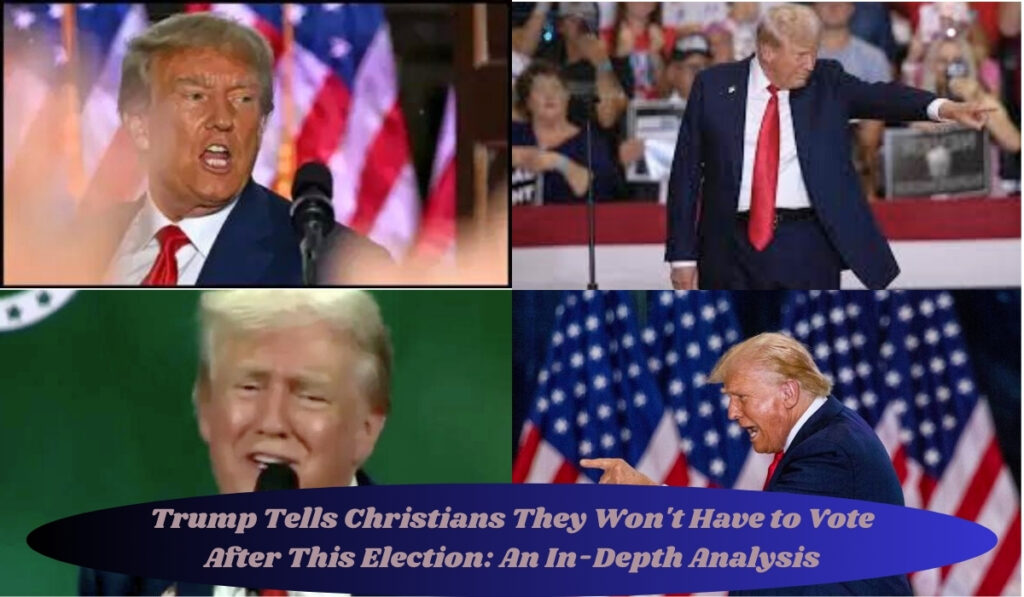Introduction
In a recent speech, former President Donald Trump made a controversial remark to Christians, suggesting that if they vote for him in the upcoming election, they won’t have to vote again in the future. This statement has sparked significant debate and confusion, especially in light of Trump’s past actions and the current political climate. In this detailed analysis, we will explore the context, implications, and reactions to his remarks, providing a comprehensive understanding of the situation.
The Event and Trump’s Remarks
Context of the Speech
Donald Trump made his comments during an event organized by the conservative group Turning Point Action in West Palm Beach, Florida. This event was part of his ongoing campaign for the 2024 presidential election, where he is running as the Republican candidate.
The Controversial Statement
He told the crowd, “Christians, get out and cast a ballot, simply this time. In four years, you don’t have to project a polling form again. We’ll have it fixed so perfect; you should project a polling form.” He repeated this assessment a couple of times, highlighting his love for Christians and his own Christian certainty.
Immediate Reactions
His remarks were met with mixed reactions. While some of his supporters cheered, others were confused or concerned about the implications of his statement. The media and political analysts quickly began to scrutinize and interpret his words.
Interpretation of Trump’s Remarks
Ambiguity and Possible Meanings
It was not immediately clear what he meant by saying Christians wouldn’t have to vote again after this election. Some possible interpretations include:
- A Joke or Hyperbole: Trump is known for his provocative and sometimes hyperbolic statements. He might have been joking or exaggerating to energize his base.
- A Promise of Effective Governance: Trump could be implying that his leadership would be so effective that future elections would be unnecessary, although this interpretation is problematic given the democratic principles of the United States.
- A Threat to Democracy: Critics argue that his statement could be seen as undermining the democratic process, especially considering his past actions regarding the 2020 election.
Trump’s Past Comments on Dictatorship
In December, he told Fox News that if he won the election, he would be a dictator but only on “day one” to address specific issues like border security and oil drilling. Although he later claimed this was a joke, such statements contribute to concerns about his commitment to democratic norms.
Reactions from Political Figures and Analysts
Trump’s Campaign Spokesperson
When asked to clarify his remarks, his campaign spokesperson, Steven Cheung, stated that hewas talking about uniting the country. Cheung also blamed the divisive political environment for the recent attempted assassination of him.
Democratic Response
Democrats, including Jason Singer, a spokesperson for Kamala Harris’s campaign, described his speech as “bizarre” and “backward-looking.” They criticized his remarks as another example of his problematic rhetoric and behavior.
Media and Public Analysis
The media has extensively covered his comments, with various interpretations and opinions being presented. Some outlets emphasize the potential threat to democracy, while others focus on the idea that he was simply trying to motivate his base.
Historical Context: Comparing Trump to FDR
Franklin D. Roosevelt’s Presidency
Trump’s comments about not expecting to cast a ballot again likewise infer verifiable examinations. Franklin D. Roosevelt (FDR) is the main U.S. president to have served multiple terms. He was chosen multiple times, serving almost 16 years before the two-service time boundary laid out
The Two-Term Limit
The 22nd Amendment, approved in 1951, limits presidents to two terms. This change was an immediate reaction to FDR’s lengthy administration. His reference to FDR in his discourse at a Public Rifle Affiliation gathering in May additionally features his advantage in serving different terms.
The 2024 Presidential Race
Tightening Race
The 2024 presidential race has become increasingly competitive following President Joe Biden’s decision not to seek reelection. Vice President Kamala Harris is currently the hypothetical Vote based candidate. Recent opinion polls indicate that Harris has closed the gap on Trump, making the election highly contested.
Evangelical Support
Trump has historically enjoyed strong support from evangelical Christians, a key demographic in his base. His recent remarks appear to be an attempt to mobilize this group, reminding them of his commitment to their values and interests.
Implications for Democracy
Potential Threats
Trump’s comments, whether intended as a joke or not, raise concerns about the potential erosion of democratic norms. His previous attempts to overturn the 2020 election results, culminating in the January 6th insurrection at the U.S. Capitol, have already cast a shadow over his commitment to democracy.
The Importance of Voting
The option to cast a ballot is a principal part of a vote-based system. Any idea that casting a ballot could become superfluous or out of date is disturbing. It is essential to maintain the significance of casting a ballot as a method for residents to communicate their will and consider pioneers responsible.
Conclusion
Donald Trump’s remarks about Christians not needing to vote again after this election have sparked widespread debate and concern. While some interpret his comments as a joke or an attempt to motivate his base, others see them as a potential threat to democratic principles. As the 2024 presidential race intensifies, it is essential to remain vigilant and uphold the values of democracy, ensuring that every citizen’s right to vote is protected and respected.
References
- “Trump tells Christians they won’t have to vote after this election.” Reuters. Link to source
- “The Believers Summit 2024 in West Palm Beach.” Reuters. Link to source
- “Trump jokes about being a dictator on ‘day one’ if he wins.” Fox News. Link to source
- “Franklin D. Roosevelt’s Presidency and the 22nd Amendment.” History.com. Link to source
- “The 2024 Presidential Election: Biden’s Decision and Harris’s Candidacy.” The New York Times. Link to source

